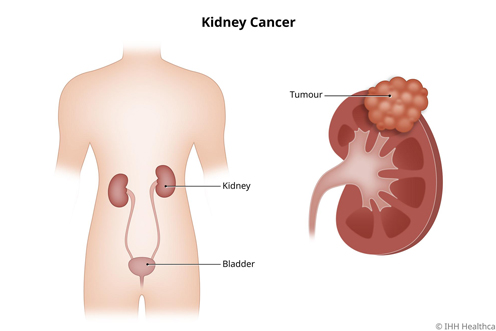Kidney Tumor
A kidney tumor is an abnormal growth of cells in the kidney. Understanding kidney tumors is essential for timely diagnosis and appropriate treatment.

What is a Kidney Tumor?
A kidney tumor is an abnormal mass that forms in the kidney. Tumors can be benign (non-cancerous) or malignant (cancerous), and they can vary in size and aggressiveness.
Types of Kidney Tumors
There are several types of kidney tumors, including:
- Renal Cell Carcinoma (RCC): The most common type of kidney cancer, accounting for about 90% of cases.
- Transitional Cell Carcinoma: A type of cancer that affects the lining of the renal pelvis and ureter.
- Wilms Tumor: A rare type of kidney cancer that primarily affects children.
Causes and Risk Factors of Kidney Tumors
The exact cause of kidney tumors is often unknown, but certain factors may increase the risk, including:
- Smoking: Smoking tobacco increases the risk of kidney cancer.
- Obesity: Being overweight or obese increases the risk of kidney cancer.
- High blood pressure: Hypertension is a risk factor for kidney cancer.
- Family history: Having a family history of kidney cancer increases the risk.
Symptoms of Kidney Tumors
Symptoms of kidney tumors may include:
- Blood in the urine: Hematuria is a common symptom of kidney tumors.
- Back pain: Pain in the side or lower back that doesn't go away.
- Weight loss: Unexplained weight loss may occur in some cases.
- Fatigue: Feeling tired or weak, even with plenty of rest.
Diagnosing Kidney Tumors
Diagnosing kidney tumors involves a combination of medical history, physical examination, imaging tests, and biopsy. Imaging tests such as CT scans or MRIs can help identify the size and location of the tumor, while a biopsy can confirm the presence of cancerous cells.
Staging and Grading of Kidney Tumors
Staging and grading help determine the extent and aggressiveness of the tumor. Staging is based on the size of the tumor and whether it has spread to other parts of the body, while grading is based on the appearance of the cancer cells under a microscope.
Treatment Options for Kidney Tumors
Treatment for kidney tumors depends on the type and stage of the tumor, as well as the patient's overall health. Treatment options may include:
- Surgery: The main treatment for kidney tumors, which may involve removing part or all of the kidney.
- Radiation Therapy: Using high-energy rays to kill cancer cells.
- Chemotherapy: Using drugs to kill cancer cells.
- Targeted Therapy: Using drugs that target specific molecules involved in cancer growth.
- Immunotherapy: Stimulating the immune system to attack cancer cells..
- Minimally Invasive Treatment Options: Such as cryoablation or radiofrequency ablation.
Complications and Side Effects of Treatment
Treatment for kidney tumors can cause side effects, such as:
- Fatigue: Feeling tired or weak.
- Nausea and vomiting: Digestive issues are common side effects of treatment.
- Hair loss: Some treatments can cause hair loss.
- Complications: Surgery and other treatments can lead to complications, such as infection or bleeding.
Preventive Measures for Kidney Tumors
Preventive measures for kidney tumors may include:
- Healthy lifestyle: Eating a balanced diet and maintaining a healthy weight.
- Regular exercise: Staying active can help reduce the risk of kidney tumors.
- Avoiding tobacco: Not smoking or quitting smoking can reduce the risk of kidney tumors.
Hyderabad MultiSpeciality Hospital's Expertise in Kidney Tumor Treatment
At Hyderabad MultiSpeciality Hospital, we offer comprehensive care for patients with kidney tumors, provided by a team of urologists, oncologists, and other specialists. Our approach focuses on personalized treatment plans tailored to each patient's needs, using the latest technologies and techniques to achieve the best possible outcomes.
Advanced Technologies and Techniques in Kidney Tumor Treatment
Our hospital is equipped with state-of-the-art technologies for the diagnosis and treatment of kidney tumors. These include advanced imaging modalities, such as CT scans and MRIs, as well as minimally invasive surgical techniques for removing tumors with precision and minimal damage to surrounding tissues.
Patient Experiences and Success Stories
Patient experiences and success stories highlight the positive outcomes of our treatment for kidney tumors. These stories provide hope and encouragement to others facing similar challenges and demonstrate the effectiveness of our care.
Support and Resources for Kidney Tumor Patients
We understand that managing kidney tumors can be challenging, both physically and emotionally. That's why we offer a range of support services to help patients and their families cope with the demands of the condition. Our support services include counseling, support groups, educational resources, and financial assistance programs.
FAQs About Kidney Tumors
1. Can kidney tumors be cured?
The prognosis for kidney tumors depends on various factors, including the type and stage of the tumor. Early detection and treatment can improve the chances of a cure.
2. Are kidney tumors hereditary?
Some kidney tumors, such as Wilms tumor, can be hereditary. However, most kidney tumors are not thought to be hereditary.